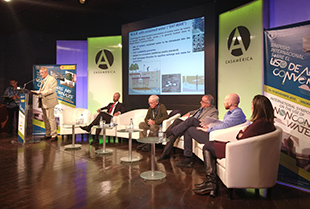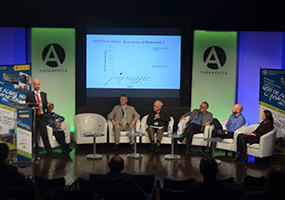Parallel Session 1.2: Fit for Purpose Water Reuse
November 14th, 16:00 – 17:30
Session Chair: Ms Birguy Lamizana-Diallo
Session Speakers:
Session Summary

While the session addressed a wide range of issues and regions, there were several consistent points brought up by all of the presenters, these are:
The current policies for the use of recycled (reclaimed) water are highly fragmented, and in many countries incomplete, which tends to inhibit the development of reclaimed water to serve as water supplies for irrigated agriculture.
There is a need to develop both policy and planning frameworks that can be used by governments, municipalities and waters resources groups to develop their specific policies and practices for developing recycled wastewater as a future water supply for irrigated agriculture.
Frameworks should be developed using One-Water principles, and that both water and nutrients should be appropriately valued as resources.
Key take home points from each speaker:
Mr Javier Mateo-Sagasta emphasized that the use of the term “wastewater” leads to people seeing it as something to get rid off rather than a valuable resource. He also emphasized that in addition to water as a resource, wastewater has nutrients in treated water (nitrogen and phosphorous) and often micronutrients. He pointed out that there is a lack of good business models to value this resource, both in terms of water and fertilizer, which inhibited wider adoption of recycling municipal wastewater. He also pointed out there are significant social factors that can inhibit wastewater recycling for irrigation.
Mr Enrique Fernandez Escalante focused much of his discussion on the need to create standards (water quality primarily) for utilizing recycled wastewater to recharge aquifers, which can then be used for irrigated agriculture. He focused the discussion on the use of recycled water as for aquifer recharge management. He discussed efforts to develop a policy document for treatment standards when the recycled water is used for managed aquifer recharge. This policy document could then be used by countries to modify their water quality regulations to help increase the recycling of wastewater.
Mr James Oster focused on how governance systems that are developed to address one specific process in a wastewater recycling system can lead to non-sustainable water use, providing several anecdotal examples. This emphasized the need to use one-water principles when working to increase the use of recycled wastewater to support irrigated agriculture, and not focus on one step, or element, when developing policies.
Mr Redouane Choukr-Allah emphasized that there is an incomplete and fragmented regulatory framework for permitting the use of recycled wastewater for irrigation of agricultural crops. He presented the approach he is involved with in Morocco that is attempting to integrate the fragmented framework that should result in a more efficient planning and permitting process. This should help increase the amount of recycled wastewater used to support agriculture in Morocco, and could provide a model for other countries.

Mr Falk Momber discussed GIZ’s and Jordan’s collaborative efforts to encourage the development of reclaimed waste water supplies to support irrigated agriculture in the Jordan River Valley. He discussed current planning, permitting and regulatory processes that are highly fragmented and seem to inhibit the development of recycled water supplies. He also emphasized the value of reclaimed water, which has higher nutrient levels in addition to its use for irrigation. Reclaimed water can reduce the need to apply additional fertilizers.
Ms Ana Allende Prieto approached the issue from a food safety perspective addressing the points in the production chain where the food supplies could become contaminated. She pointed out that these points, and the risk of contaminating the food supply, are different for each type of agricultural crop (fiber production, grain production for livestock, grain production for human consumption, vegetables, fruits, etc.). She concluded that the permitting of the use of recycled water supplies to support irrigated agriculture, and the regulatory standards, should consider these risk factors. She pointed out the many countries current standards are the same for all recycled water use for irrigation, and that this should change. She also advocated for the use of a One-Water principle when developing water reuse policies and plans and that there is much work to be done to develop Fit for Purpose Water Reuse planning procedures and policies.

